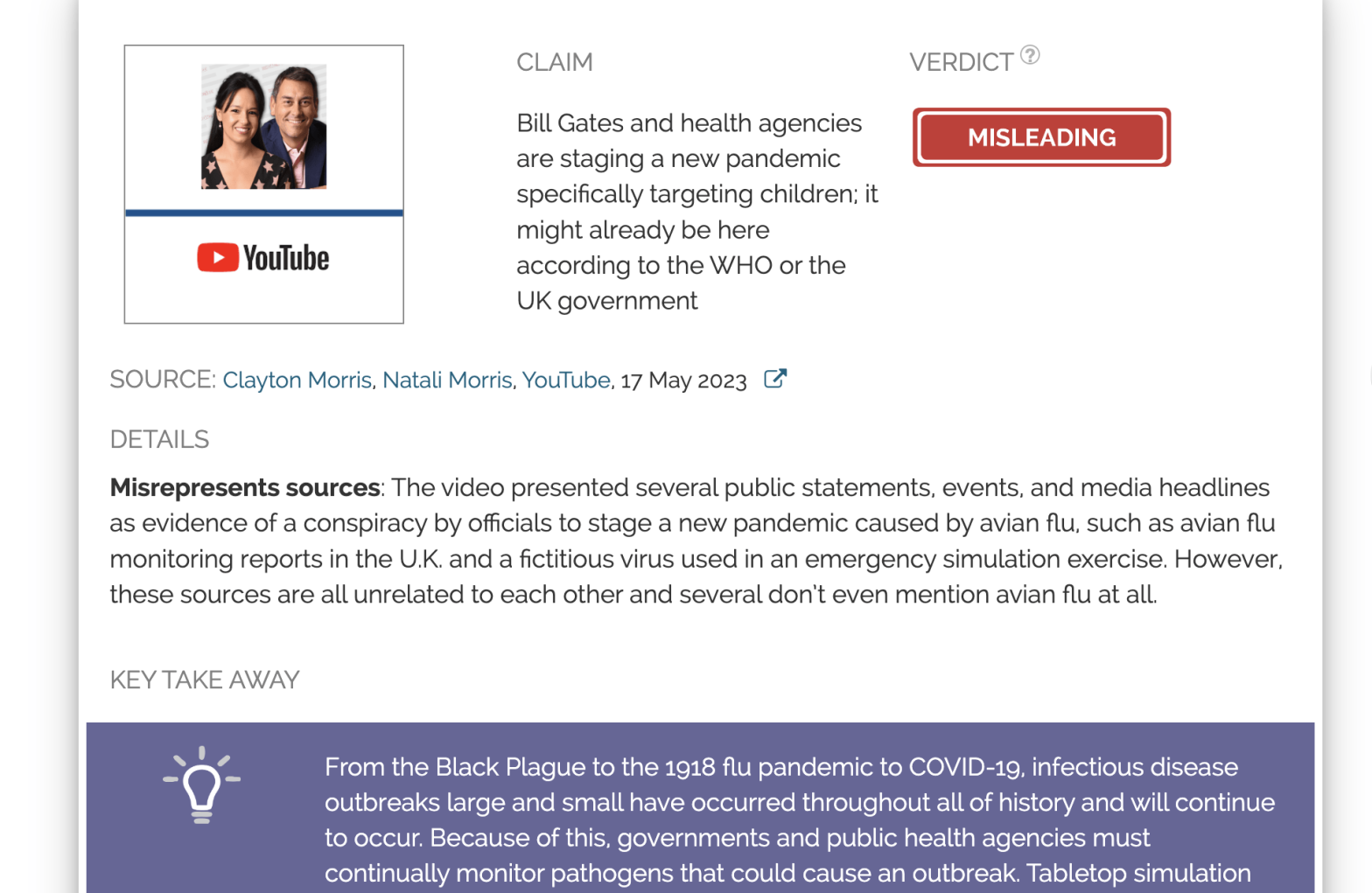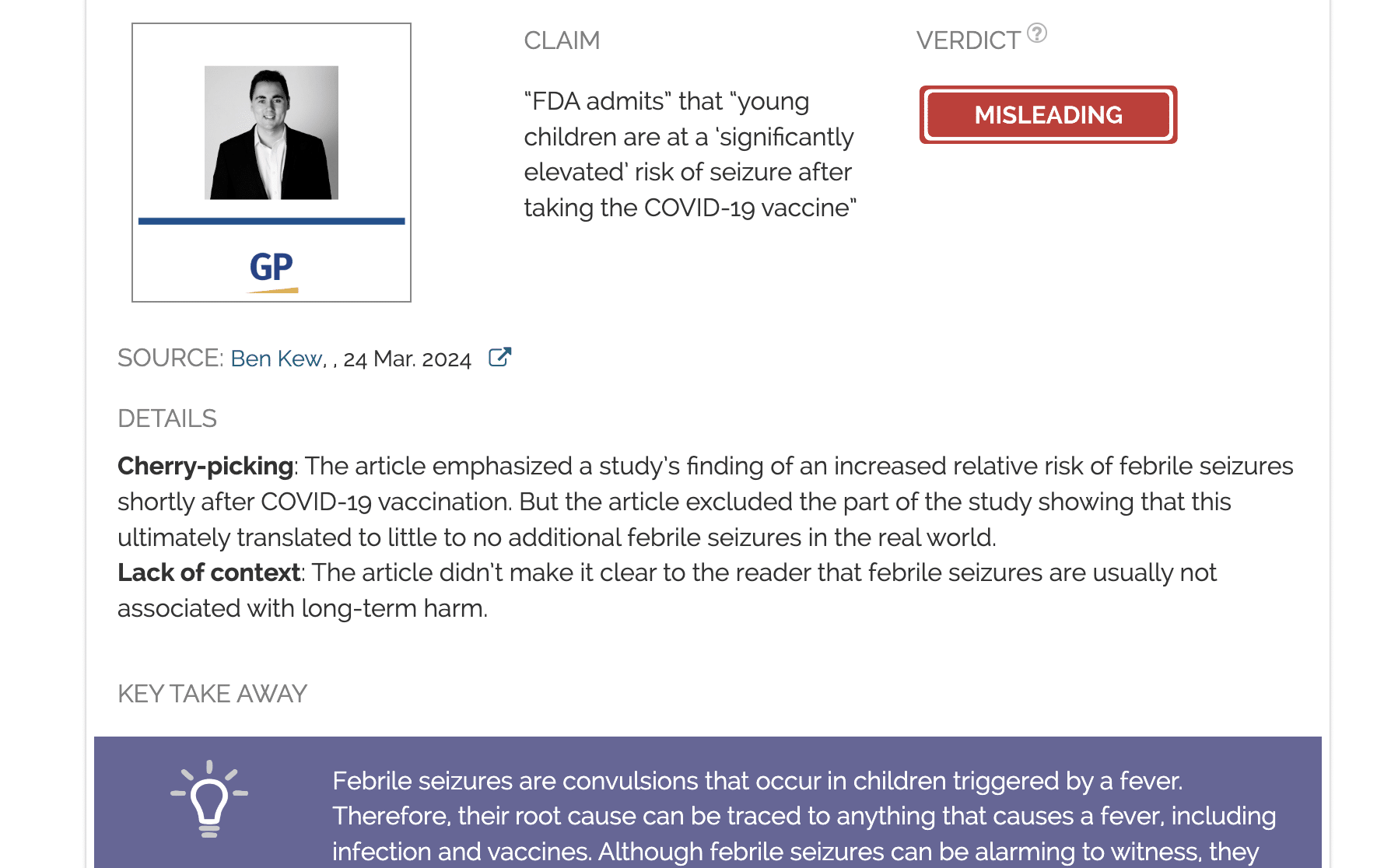- Health
No imminent avian flu pandemic is being staged by Bill Gates or the WHO; claim by Redacted YouTube channel misrepresented sources
Key takeaway
From the Black Plague to the 1918 flu pandemic to COVID-19, infectious disease outbreaks large and small have occurred throughout all of history and will continue to occur. Because of this, governments and public health agencies must continually monitor pathogens that could cause an outbreak. Tabletop simulation exercises are among public health emergency preparedness measures that aim to improve responses in case of a public health threat. The monitoring of viruses with the potential to cause a serious outbreak, such as the H5N1 avian flu virus, is also par for the course in infectious disease surveillance. Just as fire drills don’t mean a fire that occurs must have been planned, taking steps towards pandemic preparedness isn’t evidence that a pandemic is planned.
Reviewed content

Verdict:
Claim:
Bill Gates and health agencies are staging a new pandemic specifically targeting children; it might already be here according to the WHO or the UK government
Verdict detail
Misrepresents sources: The video presented several public statements, events, and media headlines as evidence of a conspiracy by officials to stage a new pandemic caused by avian flu, such as avian flu monitoring reports in the U.K. and a fictitious virus used in an emergency simulation exercise. However, these sources are all unrelated to each other and several don’t even mention avian flu at all.
Full Claim
“the next pandemic might already be here” according to the WHO or the UK government ; “they're telling us [...] that it’s gonna be specifically targeting children”; “COVID was just a warm-up” and Bill Gates and health agencies are staging a new pandemic as a second step
Review
In a video on the “Redacted” YouTube channel, entrepreneurs Clayton and Natali Morris suggested that some institutions and individuals were working together to stage an avian flu pandemic.
According to them, this false pandemic would be the second step of a global conspiracy to establish greater control over the human population—with COVID-19 being the first step. As evidence, they cited statements and headlines from a variety of sources, like the World Health Organization (WHO), UK health authorities, and Bill Gates. The video has received more than 480,000 views to date.
However, Natali and Clayton Morris’ reasoning is based on connecting unrelated elements and misrepresenting information. The couple has previously propagated several inaccurate health-related claims in the past.
Neither the WHO nor the UK government said an avian flu pandemic is imminent
According to the Morrises, the World Health Organization (WHO) warned “that we should be ready for the next [pandemic] because it’s coming”. They added that “right on cue the UK government […] announced its testing for a new avian flu outbreak”, concluding that “the next pandemic might already be here according to these clowns”.
As supporting evidence, the Morrises cited the monitoring of avian flu human cases by the UK Health Security Agency (UKHSA) and news about the detection of two cases in poultry workers. Natali Clayton also said “so now we’re testing for it in humans we’ve got a vaccine at the ready just in case […] even though we have no proof of human to human transmission”.
Overall, their language gave viewers the impression that there is a coordinated effort between the WHO and the UK government to put forth the idea of an imminent pandemic when there is actually no such risk.
However, the only WHO statement cited in their video doesn’t mention the avian flu. It is in fact a declaration by the WHO Director-General on 5 May 2023 about the end of the COVID-19 global health emergency. In it, the Director-General cautioned the public that COVID-19 “is here to stay”. Therefore, while countries can revert to their usual public health policies, they should remain vigilant. During the declaration, the Director-General didn’t make reference to an imminent deadlier pandemic.
Furthermore, the UKHSA didn’t say that there is a pandemic or that one is imminent. On the contrary, the U.K. government considers that “the risk to the general public’s health is very low”. Indeed, there hasn’t been evidence of human to human transmission of the virus since 2022.
If the UKHSA monitors and communicates about human cases of avian flu, it is because the disease proved deadly in the rare cases of human infections. Since its discovery, the avian flu virus H5N1, now circulating in the UK, has caused 860 known cases in humans, with a mortality rate of 53%. For reference, the fatality rate among all confirmed COVID-19 cases ranged between 0.1 to 5%.
H5N1 currently poses little risk to the human population because of its inefficiency at human infection and transmission, but because of its high mortality rate and because genetic mutations facilitating H5N1 infections in humans are a possibility, cases need to be closely monitored.
In conclusion, neither WHO nor the UK government stated that there is an ongoing or imminent avian flu pandemic. The fact that avian flu cases are being monitored doesn’t reflect an attempt to scare people or push the narrative of a new pandemic. It is because avian flu is a possible threat that must be monitored.
No indication that the communication around an avian flu pandemic is the second step of a plan, after COVID-19
Natali and Clayton Morris also suggested this so-called next pandemic is part of a larger plan, in which COVID-19 was the first step.
They said: “So many of these things were talked about and predicted ahead of time by Bill Gates and Dr Fauci and these leaders who were […] telling us that this was all coming and then a few months later it comes”. They also added “It feels like COVID was just a warm up”. That they referred to Bill Gates is indicative of the conspiratorial bent of their claim. Indeed, Gates is frequently the target of various COVID- and vaccine-related conspiracy theories.
The Morrises doubled down on their claim of Bill Gates’ involvement in staging this next pandemic as part of a larger plan by showing an interview of him. However, this is an interview from January 2021, two years before the WHO declaration that the emergency crisis of COVID-19 was over, and before the detection of avian flu cases among humans in the UK. Therefore it is unclear on what basis the Morrises thought Bill Gates’ interview was connected with these later events.
According to Clayton Morris, their claim is purportedly supported by Bill Gates speaking in the interview about “how we need to get past part one of this which is getting rid of the first pandemic […] so we close that narrative down and then we move on to the second piece”.
However, Bill Gates was in fact explaining that two goals were important: a short term goal of ending the COVID-19 pandemic—that was still going on at the time of the interview—and a longer term goal of improving preparedness against pandemics.
The fact that Bill Gates said “there will be another pandemic” doesn’t mean that Bill Gates is staging or preparing one. Pandemics have occurred throughout history as a result of naturally occurring, sporadic events. Stating that one will occur someday doesn’t mean that whoever said that is responsible for it. It is the same as saying “one day a plane will crash”. Given that such an event is almost a given since we continue to use planes and nothing is 100% safe, such a statement is simply an acknowledgement of reality and doesn’t make whoever said it responsible for the next crash.
No indication of an ongoing pandemic targeting children
Clayton and Natali Morris also claimed that people pushing the narrative of a new incoming pandemic also alleged that the pandemic would target children. They said, “they’re telling us […] that it’s gonna be specifically targeting children”.
It is unclear however what the Morrises’ evidence for a pandemic targeting children actually is. The only element in their segment that mentioned a new pandemic targeting children is a tabletop simulation exercise called Catastrophic Contagion, which featured a hypothetical virus that was especially deadly to children.
However, the Catastrophic Contagion scenario doesn’t involve the avian flu. The scenario involves a fictitious enterovirus, whereas the avian flu belongs to a different genus alpha influenzavirus. Furthermore, as the name indicates, a tabletop simulation isn’t real.
The Morrises didn’t explain why they thought the news about avian flu and Catastrophic Contagion were related to each other.
This is not the first time Clayton and Natali Morris used the Catastrophic Contagion tabletop simulation to promote the idea that some people or institutions are planning a future pandemic. Health Feedback covered a previous instance in an earlier review published in January 2023.
In that review, we explained that tabletop simulations are a normal and necessary part of public health emergency preparedness. They help national and global health agencies improve their response plan and enhance their coordination. This isn’t unlike the way fire drills help prepare people to react accordingly during an actual fire.
The notion that pandemic simulation exercises in themselves necessarily precede a future public health crisis, real or merely staged, is disproven by the fact that multiple tabletop exercises similar to Catastrophic Contagion took place in the past and weren’t followed by real-world emergencies.
Just as the occurrence of a fire drill doesn’t in any way mean that a fire that occurs in the future was planned, the fact that the tabletop exercise occurred isn’t evidence that a pandemic is being planned.
The decision to focus on a fictitious virus that targets children is explained on the Johns Hopkins Center for Health Security website about Catastrophic Contagion. In it, the organizers highlighted the need for more information to better formulate public health policy decisions regarding children:
“In the early days of a major new contagious disease epidemic, there could be a brief window of opportunity to stop it from becoming a pandemic. To successfully contain such an outbreak, decisive and bold action would need to be taken in the face of incomplete data, high scientific uncertainty, and potential political resistance […] It may seem like all these critical policy decisions have been resolved during the COVID-19 pandemic, but they have not […] The exercise raised a pivotal question: If future pandemics have a much higher lethality than COVID-19, or for example, if they affect predominantly children, would or should countries take different, stronger, earlier measures to contain it, and what are those measures?”
Conclusion
In their video, Clayton and Natali Morris wove together unrelated elements, such as newspaper headlines and public statements from public health agencies and misrepresented their content to create a conspiracy theory about a looming, deadly, and staged pandemic.
Neither the monitoring of avian flu cases or pandemic simulation exercises are indicative of a planned pandemic. Nor did the WHO state that an avian flu pandemic was imminent. And none of these sources support the Morrises’ claim that the next pandemic would target children.
Just like earthquakes and floods, epidemics are among natural phenomena bound to happen and whose consequences can be mitigated or worsened depending on how people choose to respond to them. Indeed, mathematical models indicate that the probability of epidemics might increase in the next decades[1]. Climate change is also expected to exacerbate the problem. The fact that institutions, individuals, and the media discuss the risks of pandemics and the appropriate responses to them isn’t a sign of fear mongering but rather steps to mitigate the effects of a potential pandemic.
REFERENCES
1 – Marani et al. (2021) Intensity and frequency of extreme novel epidemics. Proceedings of the National Academy of Sciences



